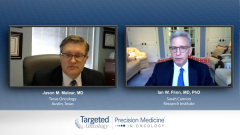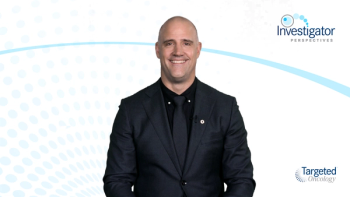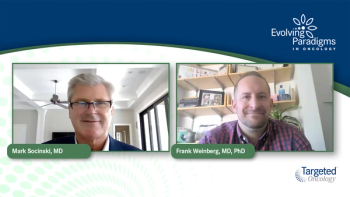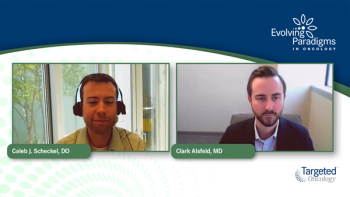
Future of PI3K Inhibitors in RR FL and MZL
Expert hematologist/oncologists provide thoughts on the potential role of PI3K inhibitors in managing R/R FL and MZL, as well as other diseases.
Episodes in this series

Ian W. Flinn, MD, PhD: What are your thoughts about the future? What is on the horizon in terms of research across these diseases, follicular lymphoma, marginal zone lymphoma, and CLL [chronic lymphocytic leukemia]? What are you investigating that you think is exciting that is, ultimately, going to get to the market? We have seen a lot of different agents being tested: bispecifics, CAR [chimeric antigen receptor] T cells, a lot of other immunotherapies. What is exciting to you?
Jason M. Melear, MD: I think my goal would be to get chemotherapy-free regimens; it would be wonderful. I really like that trial you are looking at, the one where you are using the 2 agents up front. I think that is exciting. As you mentioned, we just had the CAR T approval for treating relapsed follicular lymphoma; I do not know how much CAR T in its present form I am excited about for treating patients with low-grade lymphomas. I think there is a subset of younger patients with aggressive disease that it makes sense for. I hope to get more therapies that are less toxic as these patients live many years. I hope the bispecifics that you can even get off the shelf will be something you can use in the future.
They are looking at those, and we have some trials we have been working with in myeloma. Some of them are even subcutaneous with a whole lot less cytokine release syndrome and neurologic toxicity, so hopefully those will also help in the treatment follicular lymphoma, be good treatment option, and a lot easier to use, I think, than the CAR T therapy. The newer BTK [Bruton tyrosine kinase] inhibitor—the LOXO-305 [Pirtobrutinib] agent—I know that it is used in the treatment of CLL and mantle cell lymphoma, but that is so good, and so hopefully that will also spill over into some of the treatments for other lymphomas. That looks, to me, like it has minimal [adverse] effects and excellent response rates in people who were unable to take other agents. That is another agent that looks pretty exciting overall that is an oral agent. Are you seeing things other than that, or in that same realm, that you think are exciting?
Ian W. Flinn, MD, PhD: Yes, I think it is very similar to your experience. We are investigating several different bispecific antibodies. The most mature is thymosin, which has been presented several times at ASH [the American Society of Hematology annual meeting] and other forums. It is highly active; the adverse event profile is much easier for patients to process than say, CAR T cells, and so it is getting away from all the cytokine release syndrome and the neurotoxicity. It is much easier. They can be given subcutaneously, and that is so much easier to give than CAR T cells. It can be given in the community offices; it does not take a specialized center to do that, and so hopefully, we’ll see that make its way through the regulatory pathway soon. Hopefully, that will come out.
I think CAR T cells are important, and the next-generation CAR T cells that we are investigating have a much more benign safety profile as well. Those look like they might be easier for patients, but as you mentioned, there are not that many patients with follicular lymphoma who would benefit from CAR T cells. Based on some of these studies, such as those utilizing data from the National LymphoCare database, 80% of patients with follicular lymphoma have nearly a normal rate of survival. It is only that 20% of patients, the early progressors, the patients with so-called POD24 [progression of disease within 24 months] who really benefit from these aggressive therapies. It is going to be a rare patient who I’d really want to give CAR T cells to—at least, as you mentioned, in their current configuration, with their current adverse event profile.
Jason M. Melear, MD: I do look at the EZH2 [enhancer of zeste homolog 2] inhibitors a bit, too, and hopefully, with their effectiveness, we can put them in there. Again, combination therapy is going to be the answer there, whether we add it with another CD20 agent or get to triplets with R squared [rituximab and lenalidomide] plus another oral agent, or something like that. I do not know how aggressive we need to be with these cases of follicular lymphoma, but maybe one day we can start saying we are curing those patients with follicular lymphoma with some pills up front. That would be wonderful.
Ian W. Flinn, MD, PhD: Absolutely, I think that would be a great day. To bring up large cell lymphoma, within some of the new classification schemas there is a recognition of PI3K inhibitors being important in the treatment of some patients. It is a subset of patients with large cell lymphoma, so it is conceivable that PI3 kinase inhibitors—probably not as a single agent, but in combination with other therapies—might be important in treating a subset of patients with large cell lymphoma. We have seen, in all the early phase 1 trials with all the different inhibitors, that there was a response rate. Unfortunately, the duration of remissions was short in that, but it shows the activity of the drug in some patients with large cell lymphoma, and so you can imagine trying to incorporate these drugs in that setting in the future.
Jason M. Melear, MD: I know that even in the UNITY trial, there was an arm studying B-cell lymphoma that was initially in there. I think we used it with bendamustine, if I recall correctly—bendamustine Rituxan [rituximab] plus—but I have not seen any of the data for that, which makes me concerned there was not great effectiveness, but I don’t know. It would be nice if we could find some oral agents that would do a great job for patients with diffuse large B-cell lymphoma.
This transcript has been edited for clarity.








































